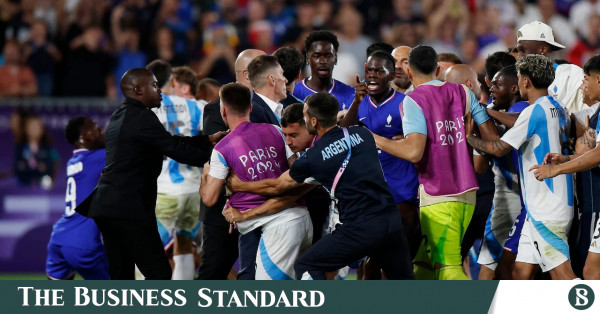France and Argentina clash at final whistle of Olympic grudge match

France’s escalating rivalry with Argentina erupted after their Olympic football quarter-final, marked by several on-pitch confrontations and players continuing their arguments down the tunnel.
Police intervened in the stands to prevent fan disorder, while players and staff from both countries clashed for several minutes following France’s 1-0 victory. Enzo Millot of France received a red card after the match for his involvement in the chaos, and further consequences may arise as officials review the video evidence.
It was nearly a perfect night for France. Their victory eliminated their rivals, with the winning goal scored by a player whose father is Congolese—a powerful counter to the racism sparked by Enzo Fernández’s video after the Copa America. Jean-Philippe Mateta headed in Michael Olise’s corner, but the events that unfolded after the final whistle will overshadow the victory.
“Argentina wanted to kill the party, but they made the party even better,” Mateta said. However, Millot seemed to provoke the Argentina bench at the conclusion of the game, which led to his sending off. French players later accused the Argentinians of being particularly vocal during the match, though they were hardly innocent themselves. At one point, Loïc Bade loomed over a downed Lucas Beltrán, pushing the limits of acceptable aggression.
“It was an important match because we felt insulted; all of France felt insulted, and we ended up as the winners of the game,” Bade stated. “They insulted throughout the game; I don’t know what they were saying because they were speaking Spanish, but they were gesturing.”
France’s Olympic team manager, Thierry Henry, could rival the world’s top diplomats for his ability to defuse tense situations, but he did not defend Millot. Expressing annoyance, he stated he could understand losing composure during the heat of a match but not antagonizing opponents after it concluded. He also criticized his team for their recklessness with a one-goal lead, arguing they should have played more conservatively in the final minutes. “You have to kill the game,” he said. “We’re not here to have fun.”
The atmosphere in Bordeaux was charged, filled with boos, jeers, and whistles. It didn’t feel very Olympian, but it was undoubtedly cathartic for France, who met the Argentinians’ warm-ups and national anthem with fury. Special ire was reserved during team announcements for Nicolás Otamendi and Julián Alvarez, two players from Javier Mascherano’s squad who had also participated in the Copa América.
This rivalry began as a straightforward footballing back-and-forth. France knocked Argentina out of the 2018 World Cup, thanks to Benjamin Pavard’s stunning outside-boot goal. Argentina sought revenge in the surreal 2022 final. Their fans sang derogatory songs about France then, and tensions flared again after they retained the Copa América last month.
What started as a rivalry has snowballed into a minor international crisis, overshadowing Argentina’s President Javier Milei’s recent meeting with Emmanuel Macron. Milei’s vice-president, Victoria Villarruel, did little to ease tensions: “No colonialist country is going to intimidate us for a field song or for telling the truths that they do not want to admit,” she said. “Enough of simulating indignation, hypocrites.”
With the matter far from resolved, encounters between these nations at the Olympics have been fraught. Argentina faced jeers during their rugby sevens quarter-final defeat to France at Stade de France last week and received similar treatment in Bordeaux.
At times, it felt as though Argentina had been advised to support international relations by letting the hosts win. This was particularly evident when Luciano Gondou skied a chance to equalize deep into 10 minutes of injury time. Mateta seemed to have sealed the result with a second goal, but it was disallowed after a lengthy VAR review, prolonging the tension and aggression.




